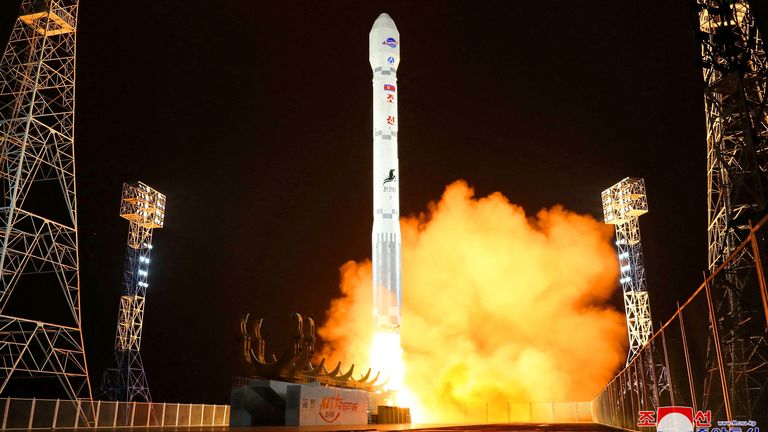South Korea has suspended part of a military agreement after North Korea defied warnings to launch a spy satellite into space.
The move means South Korea will step up surveillance along the fortified northern border, negating a clause laid out in a 2018 pact between the nations.
Images published in North Korean state media on Tuesday – which Sky News has not verified – showed what appeared to be leader Kim Jong Un watching a rocket launch from a base.
According to KCNA news agency, Mr Kim was later briefed on the satellite’s operations and viewed pictures taken above the US territory of Guam in the Pacific.
He emphasised the need for more satellites on different orbits to give his forces “abundant valuable real-time information about the enemy and further promote their responsive posture”, the agency added.
After adjustments, its reconnaissance mission is due to start on 1 December.
The satellite has entered orbit, according to South Korea’s military, but it’s too soon to evaluate how successful it has been.
President Yoon Suk Yeol, who is in the UK on a state visit, approved the suspension of the pact, known as the Comprehensive Military Agreement, which was designed to de-escalate tensions.
Critics have argued the agreement had only weakened South Korea’s ability to monitor the northern border – while North Korea had violated the agreement.
US National Security Council spokesperson Adrienne Watson described the launch as “a brazen violation of multiple UN Security Council resolutions”.
China, North Korea’s closest ally, called on all parties to ensure peace and stability.
The Malligyong-1 satellite was launched from the Sohae satellite launch facility at 10.42pm (1.42pm UK time) on Tuesday and entered orbit at 10.54pm, KCNA said.
North Korea had notified Japan of a satellite launch after two failed attempts earlier this year.
It was also the first launch since Mr Kim met Vladimir Putin at a Russian space facility in September, where the Russian president promised to help North Korea build satellites.
South Korean officials said the launch most likely involved Russian technical assistance, but some missile experts argued it is too soon for Russian help to have been fully incorporated.
